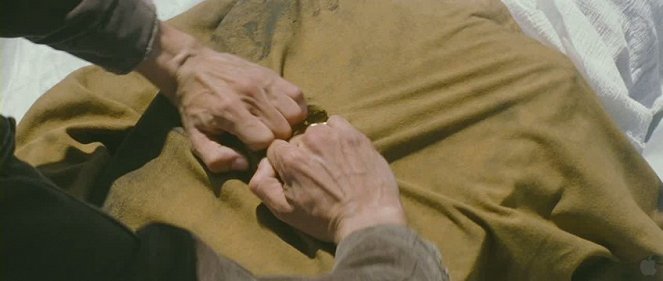Directed by:
Rian JohnsonScreenplay:
Rian JohnsonCinematography:
Steve YedlinComposer:
Nathan JohnsonCast:
Joseph Gordon-Levitt, Bruce Willis, Emily Blunt, Paul Dano, Jeff Daniels, Piper Perabo, Noah Segan, David Jensen, Jeff Chase, Garret Dillahunt, Marcus Hester (more)VOD (5)
Plots(1)
In the year 2044 time travel has not yet been invented. But in 30 years it will have been...In director Rian Johnson’s sensational action thriller, Joe (Joseph Gordon-Levitt) works as a looper, a futuristic assassin who eliminates targets sent back in time by a criminal organisation. The only rule is that you do not let your target escape – even if that target is you. The rules are put to the test when Joe is called upon to “close his loop” and assassinate his future self (Bruce Willis). In failing to pull the trigger, so begins a desperate race against the clock as Joe begins to unravel his own future and older Joe’s past. (Entertainment One)
(more)Videos (26)
Reviews (12)
Bruce Willis is able to time travel much better that this (hello 12 Monkeys). Looper is another one of those new sci-fi films (Moon, Source Code, In Time...) where it's nice to see that they can get by without a huge budget and that they can raise the hopes of genre lovers that they'll be original and fresh... But that's the end of it. In this case I liked the initial idea, the technical execution and both actors (Joseph Gordon-Levitt handled the role of Bruce Willis quite well, he wasn't even very ridiculous), but the rest wasn't worth much. Continually stupid and illogical, the clichéd passage on the farm makes me want to kill someone, and worst of all was the ending, in which - SPOILER - the hero died, but his inner voice kept on talking.
()
After the opening twenty minutes, I was prepared for a futuristic variation on existential crime films along the lines of Le Samouraï. However, Rian Johnson directs with much less focus than the precise Melville. Thought the result doesn’t fall apart like The Brothers Bloom, the film still lacks a uniform style. Despite the absolutely serious and very impressive cutaways into the mechanised life of a hired assassin (though it somehow wasn’t clear to me why the targets aren’t sent back in time already dead), Looper also contains farcical black humour, a saccharine romance, brutal “Rambo” action and a bit of telekinesis for beginners (not to mention the very western-style final conflict on the street). Johnson switches not only between a lot of genres, but also between a lot of narrators. Though the narrative thus unfolds in an interesting way, it doesn’t ultimately lead to any surprising “convergence” into a unified point. The use of multiple points of view essentially only confirms the truth of my favourite line from The Rules of the Game: “The awful thing about life is this: everyone has their reasons.” I’m afraid that the attempt to apply Bordwell’s forking-path model of narration to the film, placing in front of us two human minds influencing each other instead of two time planes, would lead us up a blind alley (though I would like to have this assumption refuted by a second viewing). More important than the time paradoxes for Johnson are the moral dilemmas with which the characters are confronted and which force us to constantly assess the situation from an emotional perspective. To whom does the future belong? Where does the line between a wasted and fulfilled life lead? What right do we have to make decisions for others? Here the non-Hollywood-style desperate fatefulness appears again, but repackaged in a more familiar, family-melodrama wrapper. I believe that if Johnson had stuck with a short runtime, as was the original plan, Looper would have been a great film about which geeks would tweet enthusiastically from the whole known internet world. As it stands, however, it is a very imaginative film that is more about sense than sensibility in conflict with its dominant sci-fi genre. 80%
()
In prehistoric times, when I was a boy reading Anderson's "Annals of the Time Patrol," I wondered how difficult it is to write (or shoot) sci-fi with time travel themes and not fall into the trap of a time paradox that has the ability to turn the story into an absurd farce. However, the problem of a time paradox is not what makes Looper unbearable in my eyes. Johnson's film is a typical summer blockbuster, which doesn't worry about illogical slip-ups in the script or rushed and bizarre relationship building. It offers potentially interesting themes, but it processes them or barely touches on them in a superficial way. The directing is routine and so is Bruce Willis' performance, which functions as a worn-out template for action heroes. Twelve Monkeys once proved that it is possible to create a smart, cultivated, and entertaining genre film about such a difficult-to-grasp phenomenon as time travel. In comparison to Gilliam's film, Looper is quite a bit worse. Overall impression: 40%.
()
Complicated, narratively muddled, and considerably unpolished. The director didn't even understand the basic thing that if you have a low-budget sci-fi film, you can't afford panoramic shots or city and traffic scenes, because if in 2044 you see a Toyota Yaris driving on the road, that's probably not entirely right. Only the smaller role of Emily Blunt and the excellently stylized Joseph Gordon-Levitt are good, he perfectly captures not only the appearance of a young Bruce Willis, but also his facial expressions and delivers great looks and lines precisely in his younger style, and it works great. Not a timeless film for sure, not very high-quality either, rather unusual, perhaps, but that's not enough.
()
With Looper, Rain Johnson was successful where Duncan Jones, with Source Code, and Andrew Niccol with, In Time, failed: making, on a low budget, an original and ambitious sci-fi movie that is also fun, smart and without major gaps of logic. Some people may not agree with the last observation (judging by the fairly numerous negative comments), but I believe Looper avoids those time travelling illogical paradoxes actually because it never explains exactly how time travel works in its universe. Source Code tries to explain it, but it doesn’t make much sense. Looper just waves its hand at that, saying that “it’s a complicated mess”, and doesn’t bother with explaining anything. I liked that. (Spoiler) But I hear those cries. If Willis, coming from the future, killed the kid’s mum, he would turn him into the dangerous villain that made Willis come back from the future, and that doesn’t make sense, because in the reality to which Willis returns, nothing like that happened. Yeah, yeah, I see the joy of those smartasses that finally found one gap in logic, and to show it off, they say that Looper is bullshit. But this film doesn’t work with such direct causality. The course of events in the climax, which result in the kid’s becoming a villain, is just one of many ways it could have happened. Different paths lead to the same outcome, many different paths lead to a probable outcome, a few different paths lead to an improbable outcome. And that’s the way Looper’s universe work, with “probability”, and it says so a couple of times, for instance, in the conversation in the diner. It’s still a bit of a mess, though, but it’s clear that, by not dealing with precise rules, the creators want to rely on something else, emotions. And I think that it works. (End of spoiler). So, that is it. In my opinion, Looper is not too far from being a truly acclaimed work. It’s original to a certain extent, fantastically made, well acted, smartly written and quite nasty towards its characters; uncompromising sci-fi. How many are there?
()



Ads